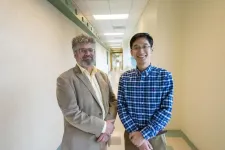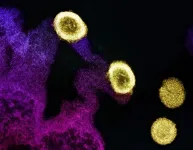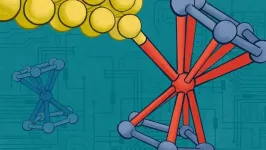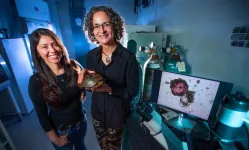(Press-News.org) Beckman Institute for Advanced Science and Technology researchers Jonathan Sweedler, a professor of chemistry, and Fan Lam, a professor of bioengineering, outlined how spatial omics technologies can reveal the molecular intricacy of the brain at different scales.
Their research appeared this month in Nature Methods.
The researchers and their colleagues used a biochemical imaging framework integrated with deep learning to create 3D molecular maps with cell specificity to better understand how the brain functions in health and disease. Their research is supported by a $3 million grant from the National Institute on Aging of the National Institutes of Health.
“If you look at the brain chemically, it’s like a soup with a bunch of ingredients,” Lam said. “Understanding the biochemistry of the brain, how it organizes spatiotemporally, and how those chemical reactions support computing is critical to having a better idea of how the brain functions in health as well as during disease.”
To understand how the brain’s chemical ingredients interact with one another, the researchers used a new imaging technique called mass spectrometry imaging to collect and analyze massive amounts of high-resolution data. They also used single-cell metabolomics and computational tools to extract data about individual molecules in single brain cells, which enabled data acquisition at unprecedented speeds and scales.
“Most people have a feeling that brain diseases such as depression and Alzheimer’s are caused by neurochemical imbalances,” Sweedler said. “But those imbalances are really hard to study and it’s difficult to understand how chemicals interact at different scales (for example, at the tissue level and individual cell level) during problems in the brain.”
According to Sweedler, creating 3D maps of chemical distributions with cell-type specificity enables researchers to further understand the complicated biochemistry within the brain, which in the long term should help address currently intractable neurological diseases.
Single-cell metabolomics, a technology critical to the researchers' findings, was named as one of Nature’s “Seven technologies to watch in 2023” along with CRISPR and the James Webb Space Telescope, speaking to the high impact these tools will continue to have as it relates to looking at cell-specific data, Sweedler said.
The research wouldn’t have been possible without the collaborative nature of the Beckman Institute.
“It truly amazes me how small interactions can turn into interesting research conversations and eventually into large-scale collaborative studies," said first author Richard Xie, a Beckman Institute Graduate Fellow. “The key is to be open-minded and interdisciplinary, as you may draw inspirations from another field. I feel very excited about the progress on leveraging different expertise across groups to engineer tools to better depict the biochemical landscape of the brain.”
Lam and Sweedler met at Xie's behest to discuss his work on single-cell and tissue mass spectrometry imaging. The team had a breakthrough in how informatics and computational methods could lead to a new kind of multimodal, multiscale biochemical imaging that’s highlighted in their recent Nature Methods paper.
Editor's notes:
The research described in this article, titled "Multiscale biochemical mapping of the brain through deep-learning-enhanced high-throughput mass spectrometry," can be access online at https://doi.org/10.1038/s41592-024-02171-3.
Full author information is available in the paper.
Research reported in this press release was supported by the National Institute on Aging of the National Institutes of Health under award number R01AG078797. The content is solely the responsibility of the authors and does not necessarily represent the official views of the National Institutes of Health.
Media contact: Jenna Kurtzweil, kurtzwe2@illinois.edu
END
Painting a molecular portrait of the brain with mass spectrometry and deep learning
Researchers used a biochemical imaging framework integrated with deep learning to create 3D molecular maps to better understand how the brain functions in health and disease
2024-03-05
ELSE PRESS RELEASES FROM THIS DATE:
Semaglutide reduces severity of common liver disease in people with HIV
2024-03-05
WHAT:
A weekly injection of semaglutide was safe and reduced the amount of fat in the liver by 31% in people with HIV and metabolic dysfunction-associated steatotic liver disease (MASLD), according to a presentation today at the 2024 Conference on Retroviruses and Opportunistic Infections (CROI) in Denver. This is the first clinical trial of semaglutide for MASLD in people with HIV. The research was sponsored by the National Institute of Allergy and Infectious Diseases (NIAID), part of the National Institutes of Health, and conducted in the United States and Brazil by ACTG, a global clinical trials network focused on HIV and other infectious diseases. ...
The Lancet: Experts warn about the overmedicalisation of menopause and call for a new approach to how society views menopause and supports women as they age
2024-03-05
The Lancet: Experts warn about the overmedicalisation of menopause and call for a new approach to how society views menopause and supports women as they age
Menopause is a life stage for half the world’s population and is generally depicted in a negative way. However, women’s experiences of menopause are unique and vary hugely.
The Lancet 2024 Series on menopause argues that an over-simplified narrative of menopause as a health problem to be solved by replacing hormones is not based on evidence and deflects attention from the need for substantial societal shifts in how menopause, and midlife/older women in general, are viewed and treated around the world.
The ...
Researchers show that menopause does not always impact mental health
2024-03-05
A new review paper from authors at Brigham and Women’s Hospital and collaborators concludes that menopause does not uniformly elevate the risk of depression and other mental health conditions.
Menopause has long been thought to cause psychological distress, but a new review suggests that this is not always the case. The review, written by experts from Brigham Women’s Hospital, a founding member of the Mass General Brigham healthcare system, and international collaborators, is the third in a series of menopause-themed papers published in The ...
Evolving hydrogen-storage technology: guidelines developed for the design of anti-evaporation catalysts
2024-03-05
1. A research team consisting of NIMS and the Tokyo Institute of Technology has identified materials capable of catalyzing the conversion of ortho-hydrogen to para-hydrogen. These catalysts should be essential to the spread of mass-transportation/storage of liquid hydrogen.
2. Hydrogen is becoming widely accepted as an alternative energy source to fossil fuels. Its liquefaction (at temperatures below -253°C under pressures higher than one atmosphere) can dramatically reduce its volume, making it suitable for transportation and storage. Hydrogen molecules (H2)—each composed of two hydrogen atoms—exist in two isomeric forms: ortho- and para-H2. Under normal conditions, ...
Early retirement impacts mental health of blue-collar women more than white-collar peers
2024-03-05
Retirement is a major transition that can have a significant impact on a person’s life.
For some, retirement evokes thoughts of slowing down, relaxing, and enjoying more of what life has to offer. For others, ending a regular work schedule can create stress and uncertainties about being able to pay necessary bills and maintain adequate medical care.
A new study by researchers at the Yale School of Public Health examines how retirement affects mental health and related inpatient mental health care among female workers in China, ...
A smart molecule beats the mutation behind most pancreatic cancer
2024-03-05
FOR IMMEDIATE RELEASE
Media Contact: LEVI GADYE (628) 399-1046
Levi.Gadye@ucsf.edu
Subscribe to UCSF News
A Smart Molecule Beats the Mutation Behind Most Pancreatic Cancer
Scientists discover a new way to disarm a deadly protein that also appears in cancers of the lung, breast and colon.
UC San Francisco researchers have designed a candidate drug that could help make pancreatic cancer, which is almost always fatal, a treatable, perhaps even curable, condition.
The new molecule permanently modifies a wily cancer-causing ...
Using light to precisely control single-molecule devices
2024-03-05
In a new Nature Communications study, Columbia Engineering researchers report that they have built highly conductive, tunable single-molecule devices in which the molecule is attached to leads by using direct metal-metal contacts. Their novel approach uses light to control the electronic properties of the devices and opens the door to broader use of metal-metal contacts that could facilitate electron transport across the single-molecule device.
The challenge
As devices continue to shrink, their electronic ...
Boston College researchers use electrocatalysis for site-specific protein modification
2024-03-05
Chestnut Hill, Mass. (03/05/2024) – Boston College researchers used a mild charge of electricity to precisely modify proteins, a new tool that can be used to develop novel biotherapeutics and protein-based research tools, the team reported recently in the journal Nature Chemistry.
The team, led by BC professors of chemistry Abhishek Chatterjee and Eranthie Weerapana, developed and optimized a novel electrochemical protein labeling reaction called "eCLIC", that enables precise modification of site-specifically incorporated 5-hydroxytryptophan (5HTP) residues on many different proteins including full-length therapeutic antibodies.
“We used this strategy to generate ...
Infotainment is coming for your news, warns Concordia Ph.D. student Robert Marinov
2024-03-05
There are plenty of reasons to worry about the quality of contemporary Canadian journalism, beyond shrinking newsrooms and attention spans.
Once considered a vital pillar of a healthy democracy, the country’s biggest newspapers have been embracing the type of content critics refer to as “infotainment,” which uses entertainment-style methods to communicate politically relevant information.
In a new paper published in the Canadian Journal of Political Science, PhD candidate Robert Marinov examines, measures and evaluates the scope and nature ...
Lab-grown liver organoid to speed up turtle research, making useful traits easier to harness
2024-03-05
AMES, Iowa – At a Biotechnology Council event a few years ago, Nicole Valenzuela’s ears perked up when she heard what a group of researchers in Iowa State University’s College of Veterinary Medicine had in the works: a method for creating a lab-grown, simplified mimic of dog intestines.
“I told them, ‘Oh! I want to do that but with turtles. Is it doable?” said Nicole Valenzuela, professor of ecology, evolution and organismal biology at Iowa State.
It is indeed doable, new research from a team led by Valenzuela shows. The three-dimensional clusters ...
LAST 30 PRESS RELEASES:
Scientists reveal our best- and worst-case scenarios for a warming Antarctica
Cleaner fish show intelligence typical of mammals
AABNet and partners launch landmark guide on the conservation of African livestock genetic resources and sustainable breeding strategies
Produce hydrogen and oxygen simultaneously from a single atom! Achieve carbon neutrality with an 'All-in-one' single-atom water electrolysis catalyst
Sleep loss linked to higher atrial fibrillation risk in working-age adults
Visible light-driven deracemization of α-aryl ketones synergistically catalyzed by thiophenols and chiral phosphoric acid
Most AI bots lack basic safety disclosures, study finds
How competitive gaming on discord fosters social connections
CU Anschutz School of Medicine receives best ranking in NIH funding in 20 years
Mayo Clinic opens patient information office in Cayman Islands
Phonon lasers unlock ultrabroadband acoustic frequency combs
Babies with an increased likelihood of autism may struggle to settle into deep, restorative sleep, according to a new study from the University of East Anglia.
National Reactor Innovation Center opens Molten Salt Thermophysical Examination Capability at INL
International Progressive MS Alliance awards €6.9 million to three studies researching therapies to address common symptoms of progressive MS
Can your soil’s color predict its health?
Biochar nanomaterials could transform medicine, energy, and climate solutions
Turning waste into power: scientists convert discarded phone batteries and industrial lignin into high-performance sodium battery materials
PhD student maps mysterious upper atmosphere of Uranus for the first time
Idaho National Laboratory to accelerate nuclear energy deployment with NVIDIA AI through the Genesis Mission
Blood test could help guide treatment decisions in germ cell tumors
New ‘scimitar-crested’ Spinosaurus species discovered in the central Sahara
“Cyborg” pancreatic organoids can monitor the maturation of islet cells
Technique to extract concepts from AI models can help steer and monitor model outputs
Study clarifies the cancer genome in domestic cats
Crested Spinosaurus fossil was aquatic, but lived 1,000 kilometers from the Tethys Sea
MULTI-evolve: Rapid evolution of complex multi-mutant proteins
A new method to steer AI output uncovers vulnerabilities and potential improvements
Why some objects in space look like snowmen
Flickering glacial climate may have shaped early human evolution
First AHA/ACC acute pulmonary embolism guideline: prompt diagnosis and treatment are key
[Press-News.org] Painting a molecular portrait of the brain with mass spectrometry and deep learningResearchers used a biochemical imaging framework integrated with deep learning to create 3D molecular maps to better understand how the brain functions in health and disease







